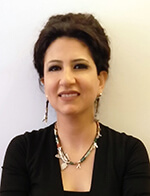

 |
|---|
Looks to the Positive Power of Viruses
In this age of viral scourges like HIV and Ebola, the notion that viruses could lead to medical therapies might seem farfetched. But to biologist Amal Rahmeh, Ph.D. ’06, viruses do more than produce illness. They hold medical promise and play a significant role in the evolution of life on earth.
“People used to study viruses mainly as pathogens, but we’ve entered a new era for biology in trying to understand the larger role that viruses play in human health,” says Dr. Rahmeh, who earned her doctorate from the Graduate School of Basic Medical Sciences Department of Biochemistry and Molecular Biology and is now an assistant professor of biology at the American University of Beirut in Lebanon.
In her research, Dr. Rahmeh explores the protein structure and function of viruses with the goals of developing anti-viral drugs, and an in-depth understanding of viral-host interactions. Her research stems from the premise that viruses need a small number of proteins to multiply in cells throughout the body. “Viruses use a minimal set of proteins to hijack the body’s cellular machinery and replicate themselves,” she says. For example, it takes only seven proteins for the Ebola virus to overtake the body and all of its defenses. “Understanding this principle will help us to find cures that target not only Ebola but also other viruses.”
The positive power of viruses drives Dr. Rahmeh’s research. For example, viruses infect ocean bacteria and have significant ecological influences on the oceans’ food webs, and carbon and nitrogen cycles; researchers are developing viruses into cancer-fighting and gene therapy agents; viruses even contribute to the formation of the placenta. “The gene syncytin is derived from an old retrovirus, which belongs to the same family as HIV, infected us millions of years ago, became part of our genome and played a role in the development of placenta,” she explains. “Infection by this virus has played a role in our own evolution.”
Dr. Rahmeh grew up in a small village in southern Lebanon. After earning her bachelor’s degree in biology and her master’s degree in biochemistry, both at the American University of Beirut, she began her doctoral studies at New York Medical College (NYMC.) Although she initially chose the College to be with friends who were studying here, she knew as soon as she arrived that she would thrive academically. “NYMC is a small community, and everybody knows everybody,” she says. “The professors have time to engage in their students’ research. There is a good amount of collaboration and plenty of time for interaction.”
Dr. Rahmeh credits the mentorship of Marietta Lee, Ph.D., professor of biochemistry and molecular biology, for guiding her as she learned about purifying proteins and developing biochemical assays. “I became a pretty good biochemist,” she recalls. She also credits her postdoctoral investigations at Harvard University for leading her to study the structure of viruses like vesicular stomatitis virus (VSV), which belongs to the same family of viruses as Ebola. “I was trying to understand how VSV proteins work, because I knew it would produce insight into targeting deadly viruses like Ebola.”
Back home in Lebanon, Dr. Rahmeh misses the United States, especially the sense of excitement and optimism she experienced during her years at NYMC. “People were always excited about new discoveries,” she says. Still, she is eager to start building her new lab, mentoring students, and one day collaborate with researchers in Europe and the U.S., including NYMC. “I’m hoping to establish a research program that will make some small contribution to science.”